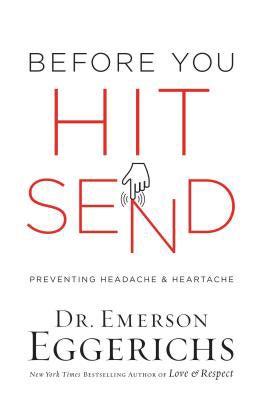Before You Hit Send
POWER OF SOCIAL MEDIA
Every 24 hours 205 billion e-mails are sent across cyberspace, 734,000 posts are added to Facebook, and 500 million Twitter posts are included. This doesn’t include Instagram, YouTube, LinkedIn, Tumblr, GooglePlus, etc. Emerson explains, “Would it be safe to then to say that out of these hundreds of billions of communications each and every day large numbers of the authors wish they had taken the time to think more carefully about all they were communicating and revised or even deleted entirely, the messages they sent out recklessly in an emotional moment?” Social media has the power to strengthen or sever a relationship, increase or negate our influence, enhance or destroy our reputation, and advance or end our career. Communicating has never become so easy and at the same time so reckless. By focusing on four basic guidelines, we can avoid some common mishaps in our everyday communication. Emerson calls these guidelines “The Golden Rules of Communication.” Before hitting send, ask yourself if your message is true, kind, necessary and clear?
Asking these questions--taken from the scripture to love your neighbor as you love yourself (Mark 12:31)—and applying them is the best way to persuade and affect others via social media. In order for others to truly hear our message, we must treat them the same way that we want to be treated.
WHAT’S INSIDE?
Emerson takes a deeper look into why we communicate the way that we do by revealing impulses like fear, selfishness, pride, etc. that entice a person to ignore asking if their message is true, kind, necessary and clear. By digging deeper, he examines several issues like why we communicate what is untrue. Emerson says, “We want to communicate the truth, but we let other factors change our minds.” For someone motivated by fear, they may not tell the truth because they dread the consequences their mistakes might bring so they cover them up. For the selfish person, they learned that lying gets them the results they want so why tell the truth? The evasive type of person may reason that, “If others don’t know what I did wrong, there’ll be fewer problems all around,” and an emotional person might tell themselves that if it feels true to them, it must be right. By exposing the core reasons why people know the difference between right and wrong and still choose to do wrong, might help them really understand why they not only make that choice but how to make better choices moving forward. Emerson explains, “Our communication is very important to God. As odd as this sounds, God is reading our mail, and when we are not truthful, we are not truthful with Him… We have an audience of One.”
RIGHTING THE WRONGS
If your communication has hurt someone, it is important to make things right. Emerson explains, “When you want to maintain the best possible relationship both with the one you offended as well as with God, you will make things right regardless of whether others do or do not. Hear what Jesus had to say in Matthew 5:23-25: ‘If you remember that your brother has something against you, leave your offering there before the altar and go; first be reconciled to your brother, and then come and present your offering. Make friends quickly with your opponent.’”







